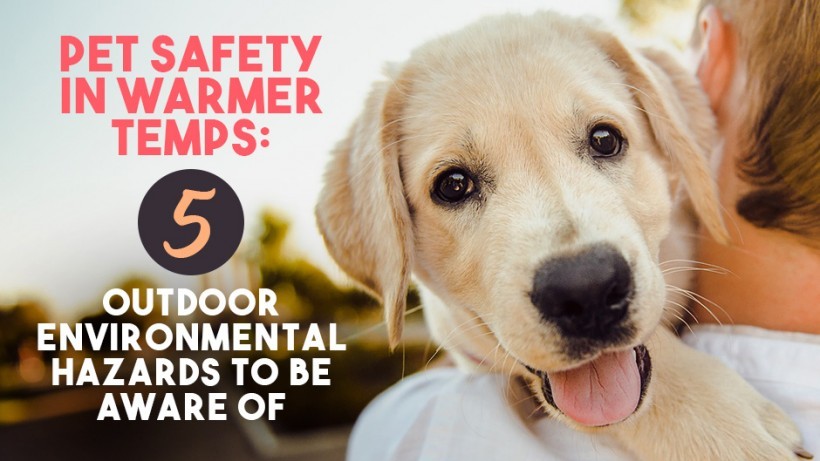Pet Safety in Warmer Temperatures

As a pet owner, you look forward to the warmer spring weather because it means you can finally spend more time outdoors with your furry friend. Unfortunately, it also means more exposure to environmental hazards for your dog or cat. This requires awareness of these dangers and active steps on your part to help your pet avoid them.
Blue-Green Algae
Cyanobacteria, more commonly known as blue-green algae, are microscopic in size and located in ponds, streams, and freshwater lakes. They can be extremely toxic to dogs, cats, horses, birds, and cows. Diarrhea, vomiting, seizures, breathing difficulty, skin and mucous membrane discoloration, and disorientation are some of the most serious symptoms associated with blue-green algae. Severe poisoning can cause death, so it’s essential to contact your veterinary team at Countryside Veterinary Clinic immediately if you suspect that your pet has ingested this, or if your pet is exhibiting any symptoms.
Fishing Lure Hazards
As you bring out your fishing gear, make sure to keep tackle and boxes out of reach of your curious canine, who likely is drawn to them by their scent. A lure can easily become embedded in your pet’s mouth or swallowed. Should this happen to your pet, please do not try to remove it on your own. Call us immediately. We may sedate your pet prior to an x-ray to help him or her from preventing further damage to their existing injury.
Unfortunately, not all anglers clean up after their fishing expeditions. Be wary of beaches and docks which may contain left-behind lures. Our pets are unable to recognize the dangers, and this is a situation where you need to see the environment through your pet’s eyes.
Leptospirosis
Leptospirosis is a disease commonly carried by raccoons. Dogs typically acquire the bacteria that causes leptospirosis through contact with infected urine, water, or soil, often left behind by raccoons. Pregnant dogs can pass the bacteria to their puppies and the disease can also affect humans.
Common symptoms including shivering, fever, appetite loss, vomiting, diarrhea, jaundice, and eye inflammation.
Treatment typically consists of a combination of supportive care and antibiotics. We will recommend the Leptospirosis vaccination for your pet if he has an exposure risk to the bacteria.
Rabies
An unvaccinated pet can acquire rabies when he or she receives a bite from an infected wild animal or has contact with its saliva. As with Leptospirosis, one common carrier of rabies include raccoons. An infected animal with saliva on its paw can transmit rabies to your pet with just a scratch. It then takes up to 60 days for the virus to travel to your pet’s central nervous system.
Typical symptoms include behavioral changes, seizures, disorientation, paralysis of the back legs, and appetite loss. No cure for rabies currently exists, which means animals in advanced stages must be euthanized. Rabies vaccinations are effective in prevention. If your pet needs his or her vaccination, contact us at 517-456-6444 to schedule an appointment.
Water Safety
Many dogs love swimming and going for a boat ride, especially when it means more time to spend with you! If you allow your dog to go swimming in open water, make sure that you’re no more than an arm’s length away, in case he or she starts to struggle. It’s also a good idea to invest in a dog-sized lifejacket for boating and being around water. Never assume that your dog instinctively knows how to swim because this simply isn’t true of all breeds.
Additionally, be aware that your dog can get an ear infection from swimming. Dog breeds with floppy ears, such as golden retrievers and cocker spaniels, are even more susceptible to this problem. Indications of an ear infection can include head shaking, odor, inflammation, and scaly skin near the ear. Be sure to let your dog’s ears dry out after swimming and clean them often to prevent infection. If you notice any signs of ear infection, please give us a call, as this is highly uncomfortable and painful for your pet.
We hope the above tips will help you enjoy a happy and healthy outdoor season with your pet!
Image credit: Pixabay
CLINIC HOURS

Monday: 8:00 a.m. — 7:00 p.m.
Tuesday: 8:00 a.m. — 6:00 p.m.
Wednesday: 8:00 a.m. — 3:00 p.m.
Thursday: 8:00 a.m. — Noon (No doctor on staff)
Friday: 8:00 a.m. — 3:00 p.m.
Every other Saturday: 8:00 a.m. — 1:00 p.m.
Sunday: Closed